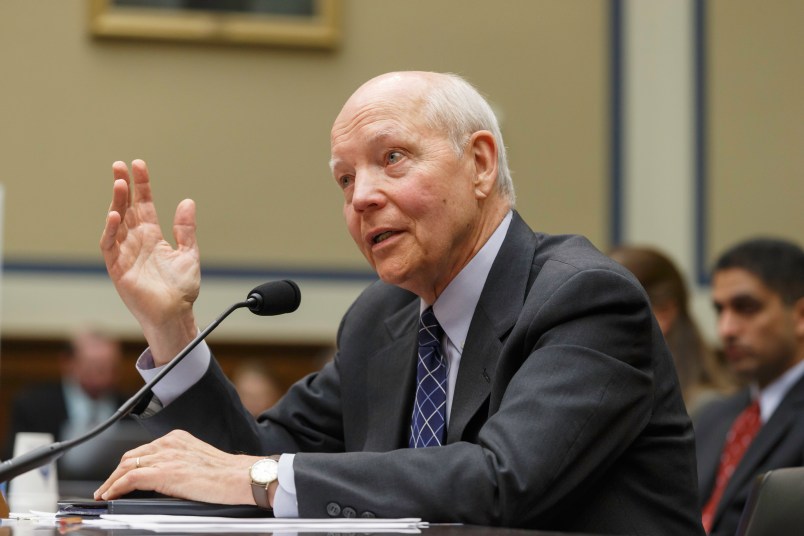Republican leaders and conservatives in the conference have agreed to hold off on a highly controversial vote to impeach IRS Commissioner John Koskinen until after the election.
While Republicans huddled Thursday to further discuss the issue, the deal was reported late Wednesday night by Politico.
The negotiation, which Politico reported was brokered by Rep. Trey Gowdy (R-SC), may help both moderates and conservatives in Congress more easily face their voters back home on election day.
As part of the deal, a vote on impeachment will be delayed until after the election, and Koskinen will come to Capitol Hill for a Judiciary Committee hearing next week where conservatives can still make a rhetorical case against him.
For moderates and Republican leadership, the vote put them in a politically untenable position. On the one hand, many Republicans felt that impeachment was too severe a punishment for Koskinen and impeaching a sub-cabinet official was unprecedented. But, the IRS is a frequent conservative punching bag and voting against impeachment could also be viewed as moderates going too easy on the IRS. There was concern for how constituents back home would respond.
Republican leaders, meanwhile, had vowed to stay neutral on the issue, but the concern was growing that such a high-profile vote ahead of the election could send a message to voters that the House was more focused on politics than it was passing more pressing legislation. Plus the Senate had already signaled it wasn’t interested in moving forward with impeachment, meaning House leaders could take a gamble on something that was going nowhere fast. Senate Finance Chairman Sen. Orrin Hatch (R-UT) told reporters that the Senate didn’t believe Koskinen had committed any impeachable offense.
Earlier in the week, it looked as though the vote may be inevitable. Rep. John Fleming (R-LA) went to the floor Tuesday and introduced his privileged resolution. He was joined by Rep. Tim Huelskamp (R-KS), a fellow member of the House Freedom Caucus who lost his primary this summer and has long had differences with leadership.
But, many members of the Freedom Caucus also feared that they didn’t have the votes to move forward with impeachment. There were concerns that members may vote to table the resolution or even outright vote against it. By punting the vote until after the election, conservatives like Fleming can continue to use it as a campaign issue all the while not having to deal with the embarrassment of being rebuffed the their own party.







More Sturm und Drang from the Crazy Caucus. Please. This is such a transparent move to embarrass President Obama and the Democratic Party. Bring it; I doubt there are a sufficient number of Senators who would vote to remove the Commissioner from office. (I regret not making a lot of money by betting that Bill Clinton would similarly not be convicted.)
Even when it’s something they want to do, they don’t do it. Worthless excuse of a Congress.
Worms will worm.
I must have missed it while reading the article twice, but the REASON or GROUNDS or CHARGES behind a vote for impeachment is what exactly? Can someone explain? Or is this just another way we don’t get our money’s worth out of the roughly $175, 000.00 plus full benefits and retirement pensions we pay each of these fools?
The Commissioner needs to turn it into a lose-lose, by knowing what he’s talking about and speaking the truth with precision and wit that helps those Rumpublicans look like bigger fools than usual. Whether he’s up for it or not will remain to be seen.